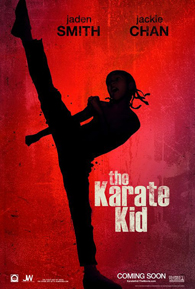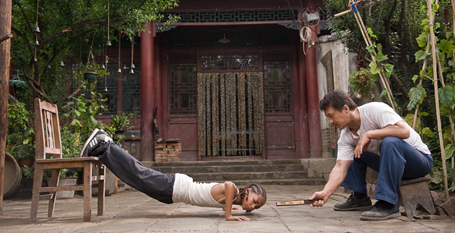
In 2010, the world’s new economic master is now China. Jaden Smith’s screen mom leaves the broken city of Detroit and relocates to China – presumably to assemble cars for Geely Automobile instead of GMC or Ford. Will Smith’s runt of a son (“Dre”) will be bullied by Chinese kids schooled by a vicious dojo master (Yu Rongguang), and Jackie Chan will arrange for Jadem to face all of them off in a public tournament – in return for an end to their attacks. And he will coach Dre himself, with some help from the masters of Mt. Wudang.
For a remake, this year’s The Karate Kid is actually pretty good. Its screenwriters know exactly what to change and what to keep the same, producing a remake that I would argue, surpasses the original film by miles. The remake identifies and distils the important concepts of the 1984 film: a coming of age of a cultural outsider, his initiation into the responsibilities of adulthood via the philosophy and discipline of martial arts, and his bonding with a much older father figure. The 2010 film is also far more emotionally realistic, with the themes of cultural isolation, bullying, and friendship being developed in a far less fairytale-like style than the original.
Obviously not a lazy or slavish reproduction, The Karate Kid ultimately stays true to the spirit of the original by being a radically different story that stands on its own while paying loving homage to its predecessor.
There’s a general rule of thumb for sequels: the sequel tends to be worse than the first film. There are very few films that run counter to this (The Godfather Part II, The Empire Strikes Back). Until The Karate Kid, though, there wasn’t an equivalent counterexample to the rule of thumb to remakes.












 Printable Version
Printable Version










Reader's Comments
Please log in to use this feature.